To strike a compromise between posting something on a weekly basis, providing more insight into a game and, well, not having anything else to write about at the moment, really – this here Rogue Trader write-up will be coming at you in parts.
Owlcat Games has intrigued me since I first heard about (and, briefly, played) Pathfinder: Kingmaker. I mean, an independent dev working exclusively on single-player RPGs, almost entirely crowdfunded and founded by former Silent Storm talent!? How could a pig resist? And even though, ultimately, Pathfinder wasn't something I got into (mainly due to the odd choice of combining a time constraint with a story-rich experience), the few hours I spent with it made a good impression (mechanics that made sense, beautiful presentation and solid writing). So when Rogue Trader loomed on the horizon, the fact I'd be playing it was a foregone conclusion.
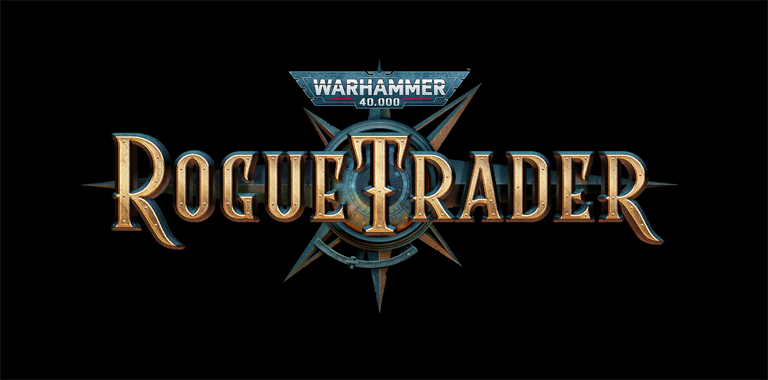
With few exceptions (Dawn of War, Mechanicus), Games Workshop-licensed, uh, games always pan out the same way: they give you an aspect of the Warhammer universe – a few units, a sliver of lore – and then leave you hanging, hoping you'll snag on the hook of their (admittedly) enticing world-building and go spend a fortune on their silly little figurines... Limiting what you can experience in a Warhammer game is almost an unwritten rule at this point and – right from the get go – it's a rule Rogue Trader chucks out into the immaterium.
From a deep character generator that gives you eight origins to play as, to an engine that allows for skill checks, branching dialogue and (almost too) extensive combat options; NPCs and opponents that span the gamut of W40K's lore (cultists and pirates and daemons and Eldar – oh my), no fewer than five gameplay modes (exploration and dialogue, personal combat, space exploration, ship combat and colony management); a rich, substantial story you can sink your teeth into and a (purported) 134 hour run-time (which I'm about 30 hours into and which will grow by 30 more hours from two upcoming DLCs come December), Rogue Trader isn't your run-of-the-mill Games Workshop cash cow.
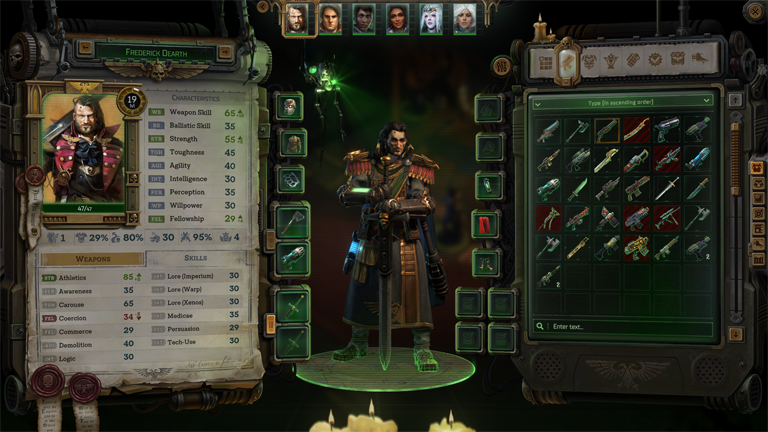
The story is straightforward but intricately detailed and goes like this: whichever origin you choose and whatever your accomplishments to date (which account for both your greatest triumph and deepest shame), you are tracked down by representatives of the Von Valancius trading family and told you are a distant relation. The rogue trader Theodora Von Valancius (an Empire-sanctioned entrepreneur who owns several star systems and can pretty much do as she pleases, so long as it benefits her sponsor) has kept an eye on you and is considering passing the mantle of her power and responsibilities onto your shoulders. You and another candidate are being considered for the role, but before the selection process can run its course, Story Stuff Happens and what you are given are the title of rogue trader, yes, and your own ship, sure, and a loyal crew of a few thousand — but also a whole heap of trouble. From that point on, your aim is to juggle Getting to the Bottom of Things, running a successful galaxy-spanning business and (as is often the case) Not Getting Killed in the Process. And – let me tell you – from what I've seen so far, it's a joyous burden to bear.
As befits an RPG of its heft, Rogue Trader, tends to stick to genre mainstays.
You control your party of six in real time, isometric glory (I'm not easily impressed, but the 450-strong Owlcat team did a wonderful job creating immersive, intriguing and, sometimes, ingenious level design) that gives you an insight into the scale and creepy, gothic grandeur of W40K no other game to date has managed to accomplish.
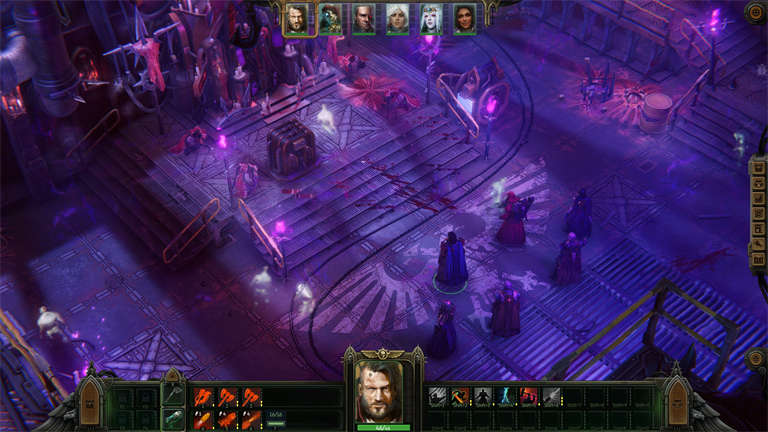
The amount of detail put into character design and backgrounds is impressive, as is the sound design (with murmuring crowds, booming Tannoy announcements, the sharp crackle of gunfire or sickly ambience of cultist hidey holes); though the music is a bit hit and miss (so far it's an even split between tracks that are pleasantly engaging and chanting – lots and lots of chanting). Even though, more often than not, your characters are too small to exhibit much detail, almost every equippable item (save, maybe, for some accessories) alters their outward appearance, which you can see in their inventory screen.
When you enter personal combat, the game reverts to an X-Com-like, turn-based affair that moves along briskly and can be a lot of fun, once you get the hang of it, but is not without its hitches.
This is not to say that the game's engine is poorly designed — far from it. Unlike other RPGs, which often exhibit a disconnect between what you think your character is capable of and what they can actually do, the statistics in Rogue Trader accurately correspond to your capabilities. Build a PC with Dodge and Parry of 95% and — guess what? You won't be getting hit that often...
The only issue is figuring out how the game actually works — and, there, Owlcat did themselves no favors. The system RT runs on is very robust, yes, but has virtually no abstraction. It's like someone popping the hood of a race car and then leaving you to figure out how the engine works... It's all very logical, but also needlessly complex and imposingly extensive and just reading a description of a single skill can often feel like scrolling through paragraphs of dialogue (and RT already has plenty of both — believe me).
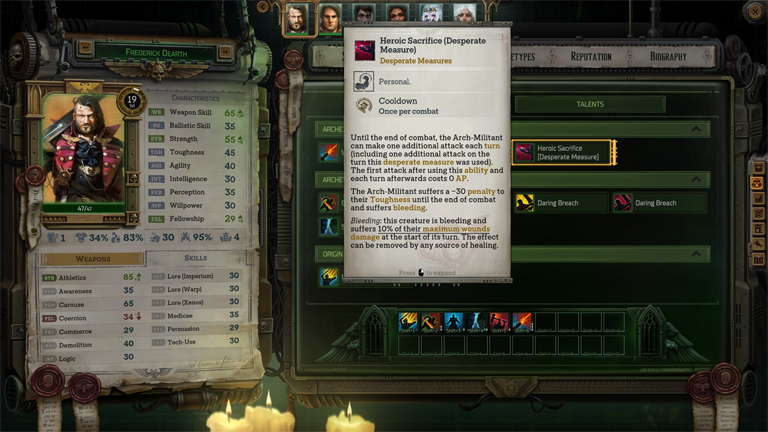
I think the game could have been improved with a bit of the old X-Com polish (burying complex mechanics beneath a simple interface that's easy to grasp), but – complex though it is – the approach is more of a refinement issue than an actual problem and once you come to grips with how it works, Rogue Trader combat is just as fun and fast-paced as any X-Com engagement.
Inventory management and trading in RT deserve a nod for their innovative approach. Unlike the more realistic, traditional solution (a weight limit tied to your PC's strength stat), the game lets you carry around as much junk as you please. But because you are a rogue trader (i.e. a person of immense wealth), you don't deal with grubby aspects of everyday life like money. Rather, your worth is represented by a single stat called Profit Factor. Between that and reputation with individual factions (which can be raised by giving them bundles of loot they are interested in), you can raise your PF and meet requirements for certain items offered by traders. Then, once requirements are met, you just say "I want it" and they give it to you. It's a fun (and lore-adherent) solution to a tired old concept that I've enjoyed immensely.
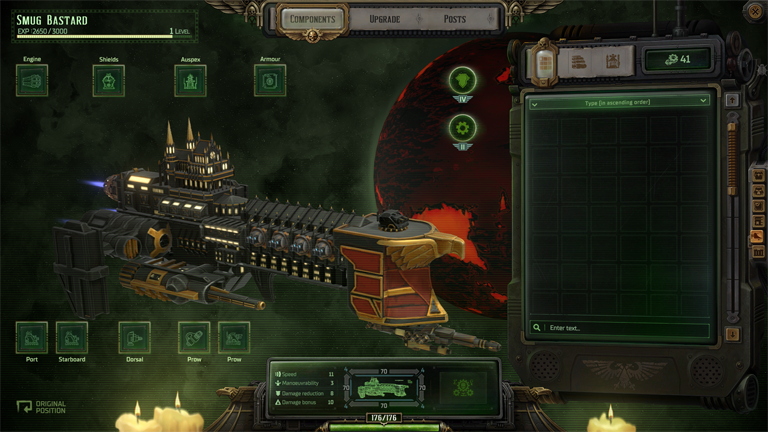
On top of exploration, dialogue and combat, Rogue Trader adds a few more gameplay elements to keep things interesting – first and foremost of which is your ship.
Depending on which version of the game you bought (and if you pre-ordered), you might be limited to just one (the Sword-class Frigate), with the cooler-looking Falchion exclusive to backers and the more imposing Firestorm to the (more expensive) Voidfarer edition; but even at its most basic, your ship is a fun component of the game that's more involved than it might at first appear.
For starters, much like the rest of your party, your ship can gain levels and abilities, can be upgraded with better equipment and weapons and can be (wo)manned by members of your crew (who, depending on their stats, can impart combat abilities of their own). It's a neat idea that gives the admittedly simpler space combat element a bit of much-needed depth.
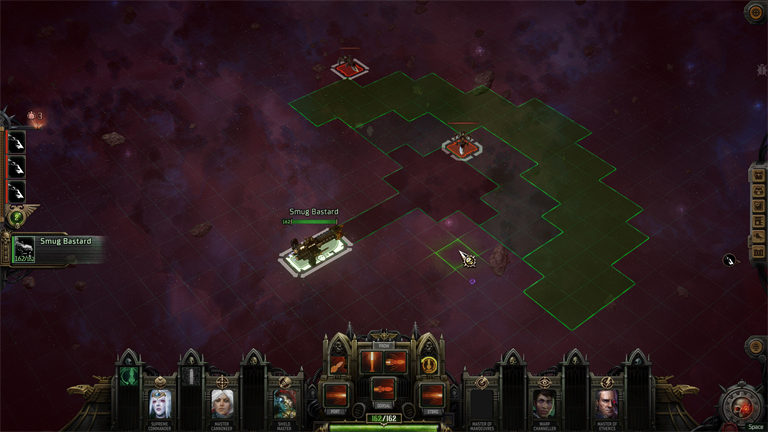
Between having to cope with momentum (space ships don't turn on a dime), a ramming attack and five weapon stations, shields, companion abilities and repairing damage to your ship by using scrap (a resource you are rewarded with after successful ship combat), the space battle component of Rogue Trader is exactly what it needs to be: a fun supplement to the main game that's not shallow enough to be gimmicky, but not so deep that it pulls focus from the core aspect of the game.
While, in the game's first chapter, you are moved from one location to the next by virtue of the plot, a few hours into chapter two (once your ship undergoes repairs) you are given free reign to explore the immaterium of the Koronus Expanse as you see fit.
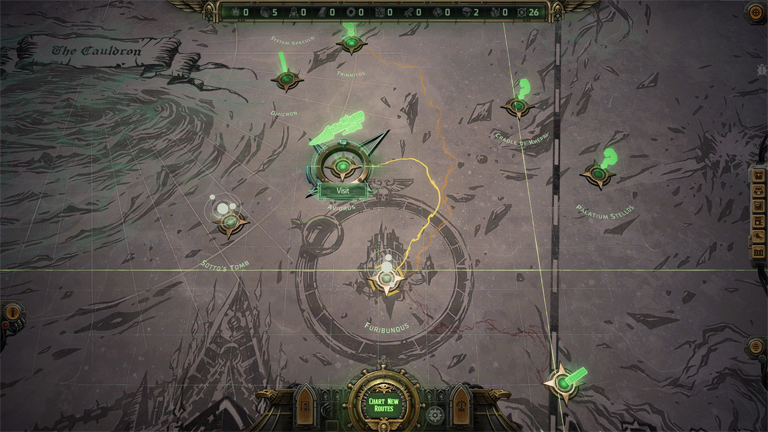
The space exploration is handled much like the world map in Baldur's Gate 2 – with set locations you can explore and random events that take place while you travel (the severity of which is dictated by the ease of passage from one system to the next). The systems themselves offer a mix of rewards (places that give you an item when you visit), text-based vignettes (places that resolve via dialogue), space battles (yarr!) and locations you can explore on foot. While not Fallout: New Vegas-humongous, the Koronus Expanse ain't exactly small (yesterday, as I started exploring, I had access to about six or seven systems, which accounted for one corner of the Expanse map).
Lastly (and in the least amount of detail), Rogue Trader also lets you fulfill contracts and manage the colonies you own. Both seem to be driven by the placement of Extractiums (machines that gather resources) and then using said resources to either expand a colony or fulfill someone's need. Unfortunately, I haven't had the chance to experience either thus far (there's a contract due in my log, but I don't have the resource to complete it).
Hopefully that gives you a decent first impression for Rogue Trader. Some technical hickups aside (hint: save often), the game is a lot of fun and not one I will likely put down for a while. If I had to recommend it based on just the 30 hours I've played so far, it'd be a no-brainer. Between a rich story, likeable characters, multiple fun game aspects and, at long last, an insight into the W40K universe that doesn't end just as it gets good, it's a real treat of an RPG in the vein of venerable old classics like Baldur's Gate or Planescape: Torment that offers X-Com-like, turn-based combat and a little space battle sideline to boot.
Yesterday, I explored a Chaos-possessed hulk drifting in the vastness of space which ended with Sister Argenta getting (yet another) concussion. Poor thing's had so many, by this stage, I'm surprised coherent dialogue is still an option... I'll be moving deeper into the immaterium this week and visiting existing Von Valancius holdings. Hopefully, come next week (and part two of the review) I'll be able to shed some light on contracts and colony management.
Pig — out.
